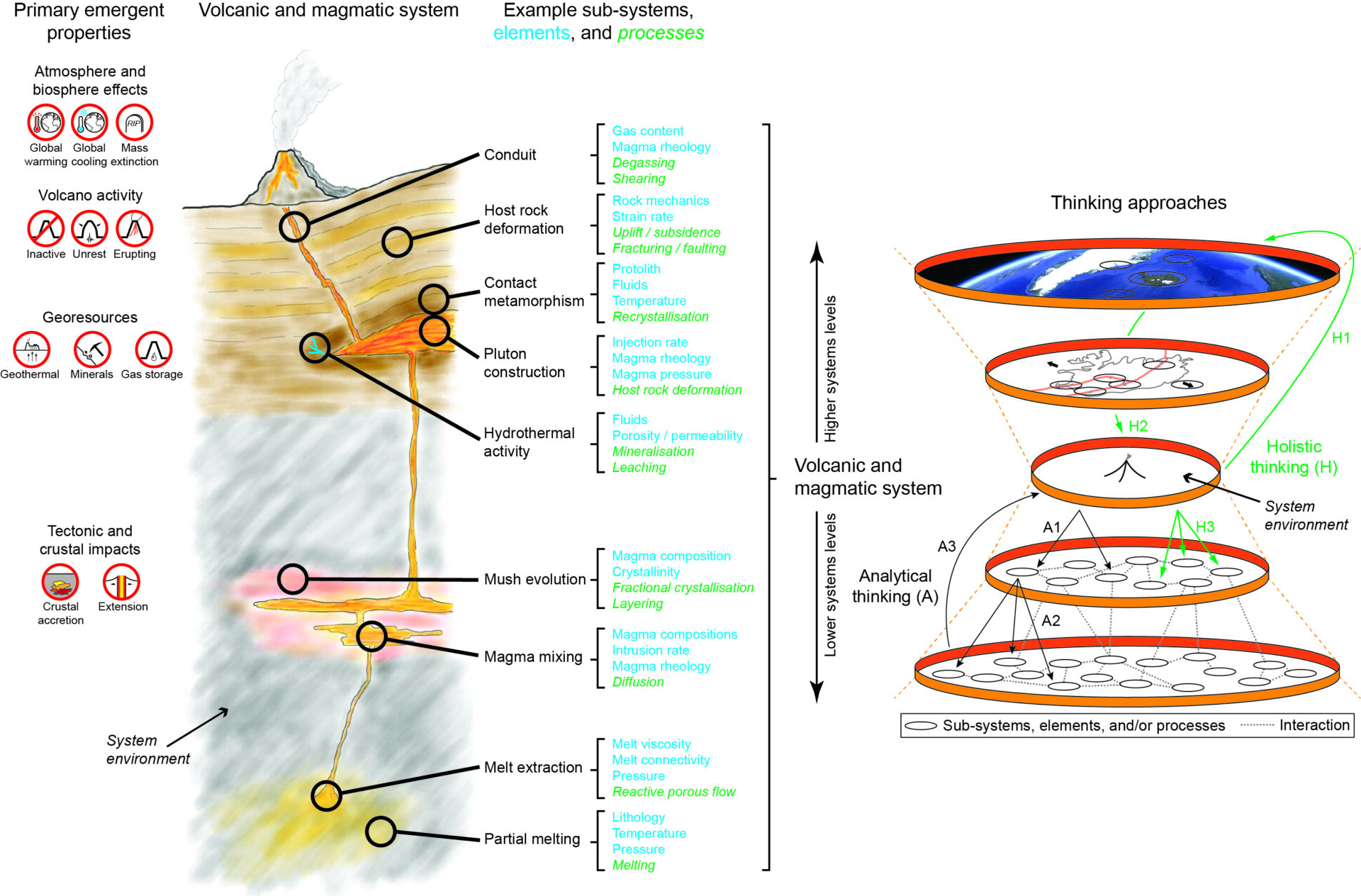Volcanic and Magmatic Complex Systems Thinking
Summary
Volcanic and magmatic systems comprise many interacting elements and processes (Fig. 1) (Magee et al. 2018). Dynamic interactions between elements, processes, and their external environment produce distinct system behaviours and products (e.g., eruptions, mineral deposits). However, these emerging properties cannot be predicted from understanding individual elements or processes alone. Volcanic and magmatic systems thus fit the definition of complex systems (Annen et al. 2025).
Complex systems are common in Earth Sciences and throughout our everyday lives. From galaxies to Earth’s climate to financial markets to scientific conferences, all can be described as complex systems. It is the connectivity and dynamic interaction between elements and processes within complex systems that drives their emergent phenomena. Complexity science provides universal tools for describing and modelling complex systems, and has revolutionised understanding and prediction of phenomena across many disciplines. Complexity science offers an exciting opportunity to similarly advance our understanding of volcanic and magmatic systems.

Figure 1: How volcanic and magmatic systems and their environment and can be broken down into sub-systems, elements, and processes that interact to produce emergent properties. Traditionally, Earth Scientists work to analytically examine volcanic and magmatic systems (i.e. we move down system levels). However, systems thinking involves an holistic approach whereby the global and regional setting of the volcanic and magmatic system is first considered (i.e. we move up system levels), before selection of sub-systems, elements, and processes to analyse.
Objectives and plan
To apply complexity science principals and techniques in volcanology, we need to adopt an holistic systems thinking approach, which differs to the analytical methods traditional to Earth Sciences (Fig. 1). You will develop systems approaches and frameworks to characterising volcanic and magmatic systems through a wide literature search and networking with scientists worldwide (Year 1). These will allow you to develop computational models, using existing graph theory (Cazabet et al. 2023) and cellular automata (Butters et al. 2017) methods, to simulate individual aspects of volcanic and magmatic systems (Year 2). Crucially, these complex systems modelling approaches do not require knowledge of the differential equations often used to describe aspects of volcanic and magmatic systems. Finally, the universal language of complex systems means initial models can be synthesised into in an holistic, fully integrated digital twin of a volcanic and magmatic system (Year 3) (Annen et al. 2025).
Impact
Complexity science has revolutionised disciplines from physics (e.g., see Nobel Prize winners, 2021) to economics to climate science: it thus offers an opportunity to similarly revolutionise volcanology. This PhD will adopt systems thinking approaches and complexity science modelling to simulate different aspects to volcanic and magmatic systems. This PhD will place you at the forefront of the volcanic and magmatic complex systems thinking revolution.
Your findings will be of interest to academics, industries (e.g., mining, geothermal), volcano observatories, and policy-makers worldwide. You will communicate findings through scientific papers, presenting at national and international conferences, and other avenues.
Training and opportunities
You will be based in the Institute for Geophysics and Tectonics at the University of Leeds but work closely with colleagues in the Sustainability Research Institute. You will receive training in complexity science and systems thinking (Magee, Cremades), and the workings of volcanic and magmatic systems (Magee, Ebmeier). Additional training in scientific writing, statistics and data analysis, problem-solving, time management, and developing independent research planning skills will also be provided by us and the YES DTN program. Through this training, you will become a confident and independent researcher with transferable skills applicable to both academic and non-academic jobs. Within Leeds, you will have the opportunity to interact with the Volcanology Research cluster, as well as many others depending on your interests.
Applicant Background
This project would suit candidates with a background in Earth Science, Complexity Science, or Systems Thinking. Some proficiency in coding would likely be beneficial but not essential. We encourage applicants from all backgrounds.
Fit to NERC Science
This project constitutes fundamental research into Earth processes and therefore fits well within the remit of NERC science. The project fits into the research areas of Volcanic Processes, Geohazards, and Earth Resources.
